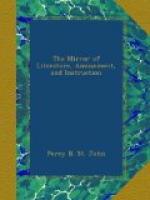In parting with the Napoleon, we might notice the conflicting opinions of the French critics on its merits; but, as that task would occupy too much space we content ourselves with the following passage from a journal published a few days subsequent to the melancholy intelligence of the death of Sir Walter Scott being received in Paris. The criticism is in every sense plain-spoken:—
“If Sir Walter Scott’s politics did not square with the natural state of things—if upon this subject he still remained the victim of early prejudices, and, perhaps, of the predilections of a poetical mind, yet he was fortunate enough to promote, by his writings, the real improvement of the people. France has reason to reproach him severely for the unaccountable statements in his “Paul’s Letters to his Kinsfolk,” and in the “History of Bonaparte.” But those errors were imputable to carelessness much more than to malice. A prose writer, a poet, a novelist—he yielded, during his long and laborious career, to the impulse of a fancy, rich, copious, and entirely independent of present circumstances, aloof from the agitations of the day, delighting in the memory of the past, and drawing from the surviving relics of ancient times the traditionary tale, to revive and embellish it. He was one of those geniuses in romance who may be said to have been impartial and disinterested, for he gave a picture of ordinary life exactly as it was. He painted man in all the varieties produced in his nature by passion and the force of circumstances, and avoided mixing up with these portraits what was merely ideal. Persons gifted with this power of forgetting themselves, as it were, and of assuming in succession an infinite series of varied characters, who live, speak, and act before us in a thousand ways that affect or delight us, such men are often susceptible of feelings the most ardent on their own account, although they may not directly express as much. It is difficult to believe that Shakspeare and Moliere, the noblest types of this class of exalted minds, did not contemplate life with feelings of deep and, perhaps, melancholy emotion. It was not so, however, with Scott, who certainly belonged not to their kindred, possessing neither the vigour of combination, nor the style which distinguished those men. Of great natural benevolence, gentle and kind, ardent in the pursuit of various knowledge, accommodating himself to the manners and sentiments of his day, good-humoured, and favoured by happy conjunctures of circumstances, Scott came forth under the most brilliant auspices, accomplishing his best and most durable works almost without an effort, and without impressing on these productions any sort of character which would connect them with the personal character of the author. If he be represented, indeed, in any part of his writings, it is in such characters as that of Morton (one of the Puritans), a sort of ambiguous, undetermined, unoffending, good sort of person.”




